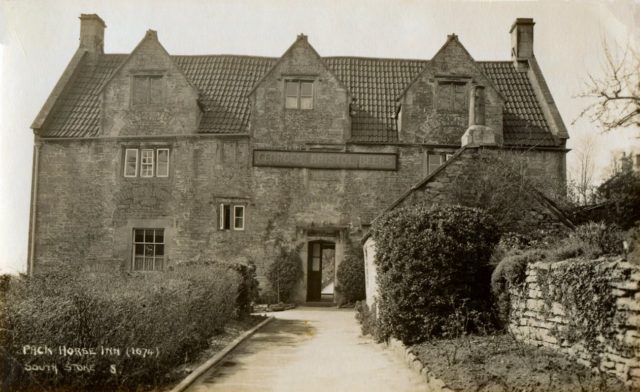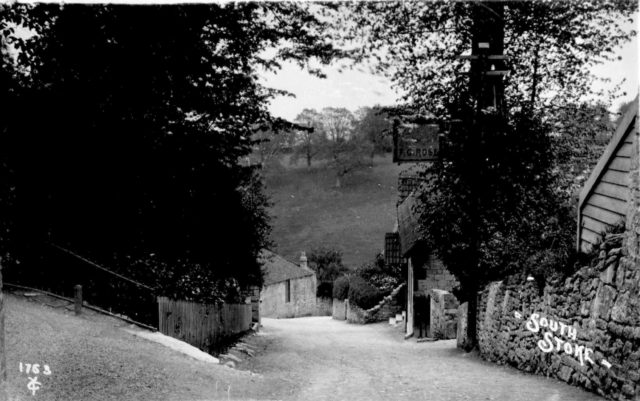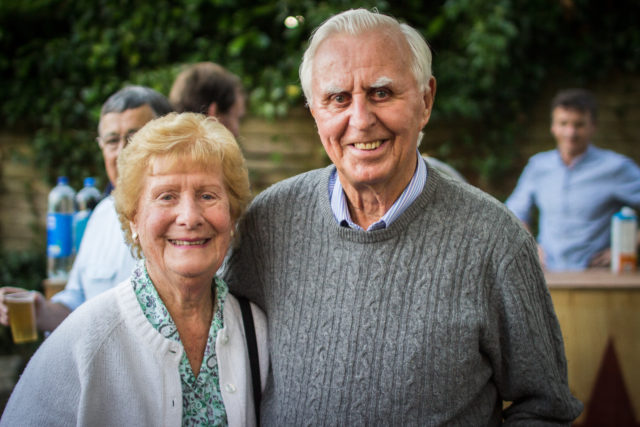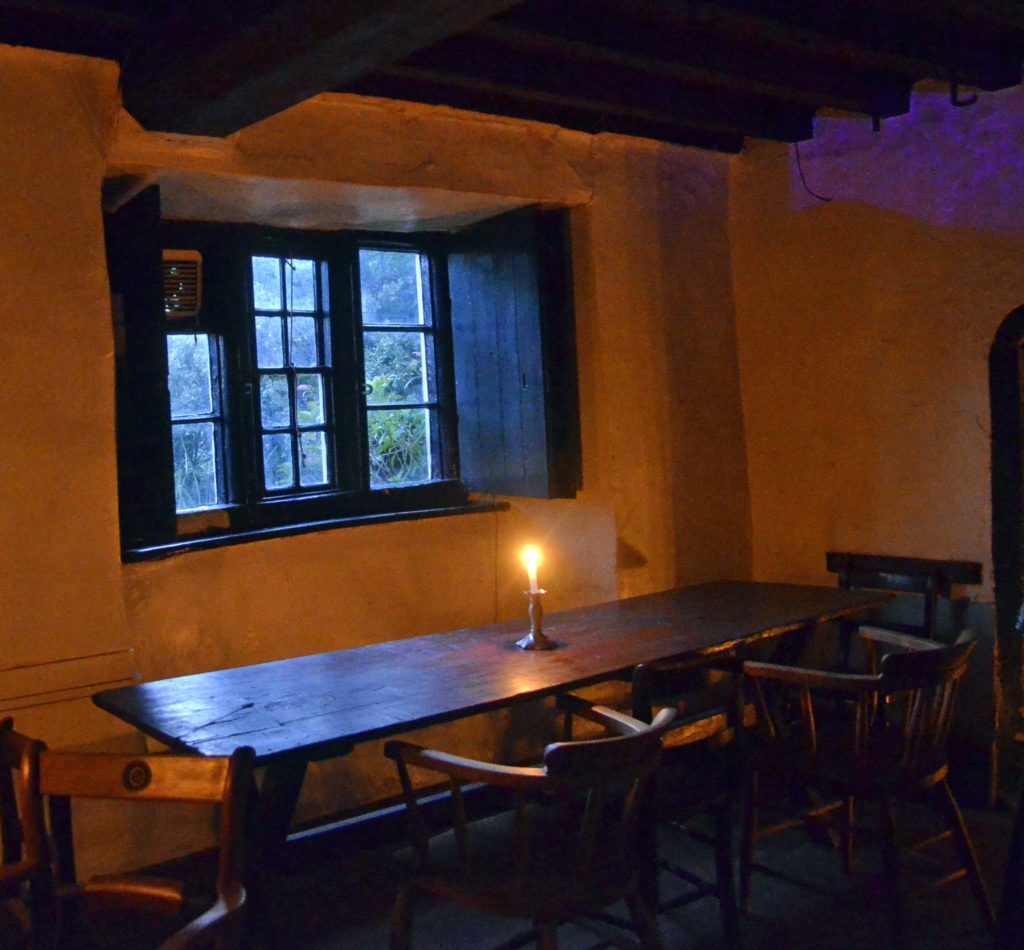I was born on 29 August 1930, in the bedroom above what is now the bar. At that time my grandparents, Fred and Emily Rose were the landlords. My great-grandfather, Thomas Quick, had held the tenancy from Holloway’s Brewery from 1890-1908, which my grandmother Emily Quick took over when he died. In 1901, Emily married Fred Rose in St James’ Church. Fred joined The Royal Flying Corps as a batman. When he returned, Emily transferred the licence to him. They held the licence from 1909 until about 1950 under a tenancy from Bath Brewery.
Fred and Emily had three sons and a daughter.
Bill joined The Royal Engineers in the 1920s, and served for a time in India. By the end of WWII he’d completed 25 years’ service, finishing with the rank of captain. He then obtained a civilian job with the army and helped with the Berlin Airlift.
Bob was a special constable in Bath and was employed by Chivers Print Works. In the 1920s he played rugby for England Schools and later captained the South Stoke cricket team.
Jack was sent to learn the licensing trade at Sainsbury’s Wine Vaults, with a view to assuming responsibility for the Packhorse. Whilst at work one day he saw a navy recruitment notice, and, without telling his family, travelled to Bristol to enlist. The family initially refused to believe what he had done. Jack was determined, however, to not take on the pub. In his early career he served on various ships and shore stations at home and abroad, and throughout the war, as a chief petty officer. He rose to the rank of officer, completing 30 years service and was posthumously awarded The Arctic Star medal for his role in the Arctic convoys on HMS Diadem. He was also involved with the liberation of Copenhagen.
Ida Florence, who was my mum (called Sis by her brothers and thereafter by everyone else), married my dad, James Albert Perkins (Jim) in St James’ on 5 September 1927, with a celebratory gathering afterwards at The Packhorse. They raised 5 children, Gerald, me (Brian), Margaret, Doreen and Diane in No 1 Packhorse Cottages. Edie Collins, an eccentric, and her mother, lived in No 2. The oldest rooms in the cottage are one above the other, linked by a spiral wooden staircase. Structural evidence indicates that there had been a building on the site since the 16th century at least. Earlier in the 20th century the two cottages were owned, along with the inn, by Georges’ Brewery.
Early Years
In the early years of my grandparents’ tenancy, what is now the Lounge Bar was the living room/kitchen for them and their four children. The bar was in the Tap Room (to the right of the front door) where a partition across the width separated it from the remainder of the room and the fireplace beyond. There were shelves for glasses on the partition and access to the tap room was through a gap. There was a large clock on the wall. The Tap Room and the lounge both had open fires. Three-legged stools were located on both sides of the Tap Room fireplace and there was an upholstered, padded banquette, where the regulars always sat, which ran the length of the wall underneath the window to the left. There are still two hooks, originally for smoking meat, in the overhead beams. It wasn’t uncommon for those who had too much beer to pull themselves up on them, in an attempt to execute a backwards flip. There were shove ha’penny and darts boards. Emily would clean the floor every day. It was often muddy and dirty from the farmworkers’ boots.

The Packhorse c1935
The lounge doubled as the family’s front room, although it was hardly used. When the Rose family were growing up in the late 1930s, the boys were digging in the dirt floors of the small cellar and found what appeared to be a huge stone coffin. Their father refused to allow them to investigate further, and the slab was concreted over. Before the war 1938/1939, Georges’ Brewery converted the cellar to a ‘modern’ kitchen with a walk-in larder, a large sink underneath the windows which overlooked the garden, a gas fire in the grate, a tiled floor (which is still there) and a huge Welsh dresser. I would call in to visit my grandmother, on my way home after a night out in Bath, and she would offer me sherry and often the remains of chicken from a carcass – which made for a tasty supper. She would refill my glass, and hers, on those occasions. As grandsons, it was our routine to present ourselves for inspection whenever we were setting out for an evening. Emily would say that older clothes didn’t matter, so long as hair and shoes were clean and tidy – an attitude that remains with me to this day.
Renovations
During Georges’ renovations, the staircase was renewed from the stone staircase, windows were put in and the fireplace in the Tap Room was rebuilt. The window to the right of the fireplace was opened up again, and cupboards were removed from the recesses either side of the fireplace, to be replaced with two comfortable sofas. There was a grandfather clock and, in later years, a large piano stood where access to the front room bar is now. It was my job to clean the floor and the windows in the front room and at one stage I reupholstered the chairs. There were brass storks and a massive display frame containing butterflies on the walls in there, presumably brought back from Bill’s time in India.
The regulars didn’t ever arrive until after 8.00 pm, and so I was able to do my homework beforehand in front of a blazing log fire. Grandfather Rose used to grow magnificent rhubarb in the chimney recess above the fireplace trap door. There had been two cupboards either side of the fireplace and, when it was rebuilt, a space was revealed on the right hand side, and another stone slab was discovered. Again, Grandfather Rose was unwilling to investigate further. It was thought that there was either a well or a priest hole underneath. It was rumoured that there was a passageway from the pub to either the church or to the Priory, but this was never found. The theory originated from suggestions that the building had once been used as accommodation for monks and that, in those times, a secure escape route might have been necessary.
The family moved their living accommodation downstairs into the new kitchen and the upstairs living room was converted into the Lounge Bar. Lifting the 18 gallon barrels of beer, which had been delivered from Bristol Brewery, was a two-man job and my dad would return from work to help. Once in place on the wooden trestle horses, the barrels were fitted with taps. Access to the bar area from the Lounge Bar was opened up in later years, after pumps were fitted in the bar.
When I was three, I developed diphtheria and spent eight weeks in a steam tent, which was erected upstairs in the north east bedroom. Emily used to care for an elderly relative who remained in bed in a bedroom opposite the top of the flight of stairs. Eventually this became too difficult for her, and he was moved to the poorhouse in Frome Road. I remember the landing was always dark, and on one occasion I tripped and tumbled from the top of the staircase to the bottom, where I banged my head against the wall. At one stage, water in the upstairs bathroom was heated by a Sadia gas heater. One day Grandfather Rose turned on the gas and forgot to light it. When he eventually did, it caused a small explosion. Luckily the pub remained intact.
Pre-War
A pre-war Packhorse Christmas was marvellous. One of my earliest memories was collecting holly and ivy from The Grove woods and hanging it across the lounge in readiness for the festivities. The pub would be open for two hours at lunchtime and again in the evening until 10 pm, after which time a private party for family and regulars would begin. Two big tables would be laid out in the Tap Room and covered with white bed sheets. A feast of hams, chicken, pickles, bread and cheese would be served to everyone. The atmosphere was always lively and noisy. There were card games in the front room and Auntie Olive would sing and play the piano. Jack Clifford, from Sunnybank, always sang ‘South of the Border”. One Christmas Eve, I was in the bedroom upstairs, instead of being on my own in our cottage. My mum regularly cleaned and helped in the pub, and so I assume that she was working that evening, which would explain why I was there. I awoke in the night to find that my dad had given me my first electric train set, which I promptly set up. I went back to sleep, and when I woke again in the morning, the batteries were flat, because I had left it running all night.
Emily provided an annual tripe supper, which was served to regulars, on tables which had been errected in the lounge. Grandfather Rose was known as ‘Snowball’. Legend had it that his hair had turned white overnight after he saw the headless horseman on his way home from his part-time gardening work at the supposedly haunted Midford Castle.
Packhorse life always involved card games in the tap room, especially solo, whist and cribbage, during which players’ faces remained deliberately expressionless and there was a strict rule of silence whilst the cards were being dealt. Our darts team belonged to a league and we challenged other Bath teams to matches.
The War

Old School Hill with Packhorse to the right c1930
During wartime, men who were working locally would bring their own bread and cheese, wrapped in a cloth, which they would spread out on the table in front of them, so that they could enjoy their lunch and beer together. For many years there was a wooden rocking horse, a see-saw and a large swinging boat on the top lawn beside the path from the pub to our cottage. There was a wooden-framed sun house/shelter, with a galvanised iron roof at the end of that lawn. The area to the left of the path was a vast vegetable patch. Emily firmly believed that a pub should be for the family, not just for the men. She bought a large metal swing and offered afternoon teas in the gardens outside the new kitchen. Grandfather Rose grew salad vegetables in the big greenhouse, which ran the length of The Priory wall. The long greenhouse was where I practised riding my first motorbike! Customers would pick their own tomatoes, lettuces and cucumbers, which they paid for in the bar. Pub suppers at weekends were served on large white plates – huge chunks of fresh bread and cheese with locally grown tomatoes and Emily’s pickled onions, walnuts and piccalilli – all for 4d. I would collect the plates from 60-80 meals on those evenings. Customers would come all the way from Twerton for one of the Packhorse’s legendary suppers.
Convalescent troops were cared for at Hodshill. When they were confined to their quarters by the matron, for various reasons, they would creep out of the back door into the allotments opposite, where we had a plot. Grandfather Rose would fill several screw top flagons with beer from the barrel and I would take them up in a sack to where the men were sitting on the grass bank, waiting to enjoy their drink and chat. At that time it was light until after 10 pm, because we had double British summertime to enable the farmers to grow extra food. I was always delighted when those who were recovered enough to come to the pub would challenge me to darts. American officers stayed at Brantwood and their troops lived in Nissan huts in the grounds. I was surprised to see black men for the first time. I provided the same beer delivery service for the black American soldiers at Brantwood. They would hold out a handful of notes and coins for me to take what I required for payment, because they did not know our currency.
Post-War
After the war there were queues of customers waiting for beer, which stretched out from the bar and up the path to our cottage on one side of the pub and out of the front door as far as the hill on the other. During rationing, the pub was allowed one tin of Smith’s crisps a week (18 packets). My grandmother would store it safely downstairs. The village formed a football club and the opposing team used the Tap Room to change in. They would wash in large tin baths, which had been carried in for their use. The hot water was provided from the wash house (now the toilets), where there was a boiler. The footballers would try to persuade my grandfather to serve them beer whilst they were changing.
In 1951, I began my National Service and was given short notice of my posting to Egypt. Edith and I decided to marry that weekend. I was allowed 48 hours’ leave for the purpose. As soon as he had finished his delivery round, Farmer Wilson drove Edith in the milk van to obtain a special licence from the Bishop of Bath and Wells. Our wedding, after a frantic two days of preparations, took place in St James’ on 3 November 1951, with a reception in Bob and Doris’ front room in the Packhorse. Doris stayed up late the night before, transforming a birthday cake into a wedding cake. Everyone contributed food, at a time when rationing was still in effect. This month we celebrated our 65th anniversary and, as we do every year, we returned to the church and the village to reminisce.
When Emily was ailing, her bed was moved into the downstairs kitchen, in front of the large Welsh dresser. My Uncle Bob had married Doris Owen, who was also from South Stoke, and when Emily died, Bob and Doris moved in to help Grandfather Rose run the pub. Grandfather Rose lived and slept in the downstairs kitchen/family room and Bob and Doris altered the bedroom where I was born, into a living room/kitchen for themselves, and their family. Bob initially continued his other employment, as well as helping in the pub. Eventually he took on the Packhorse full-time. My grandparents’ graves, along with those of my parents and my sister, Doreen, are in St James’ churchyard.
During Bob’s tenancy the village shop closed and he began selling items in the pub which were useful to the community, including paraffin, potatoes, postcards, writing paper, and envelopes. The beer was stored in the former wash house, until a burglary, at which point a chute was installed to allow the barrels to be rolled down the outside steps for safe keeping in the small cellar inside the downstairs family room. Bob and Doris’ daughter, Valerie, married Ray Wellstead. Valerie and Ray ran the pub from 1975 until 1985, by which time Courage Brewery were the owners. Ushers eventually became the owners.
In later years The Packhorse was managed by the then owner of the Cross Keys. There may have been another landlord before Colin and Sheila took over. Mike Tibble, who had been the landlord of The Huntsman in Bath, was responsible for the renovation of the top floor of the building. He installed new flooring, a kitchen, bathroom (with jacuzzi) and large bedroom, at his own cost. He was a popular landlord and it wasn’t unusual for him to serve 100 meals on a busy Sunday. In my grandfather’s time the attics were open to the staircase and they would be covered with a carpet of apples and onions. The heavy, solid door which is there now was probably transferred from elsewhere in the building.
Brian Perkins, November 2016
(Including information from The Book of South Stoke with Midford, The History of a Parish, Parfitt, Robert (ed) Bookcraft Ltd, 2001)

Brian and Edith Perkins May 2017

